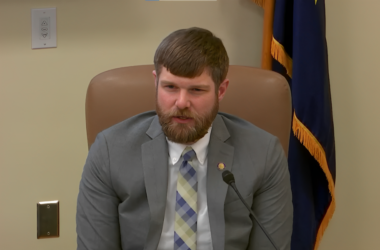In a joint session held on Monday, Mar. 18, the Alaska legislature voted to sustain Governor Mike Dunleavy’s veto of SB 140 by the slimmest margin possible: one vote. The joint session went for nearly two hours as one legislator after another delivered passionate speeches for or against an override.
The final vote was 39 yay, 20 nay, and 1 excused. The lone excused vote was Representative George Rauscher (R-District 29). While it is unclear how the Rauscher would have voted, the majority fell one vote shy of the 40 needed for a gubernatorial veto override.
The vote to sustain now sends the legislature back to the drawing board on education, which has dominated the first half of this session. As one speaker during the joint session pointed out, all other topics will continue to take a back seat. It seems likely that the current legislative session will once again go well beyond the standard time frame.
The consensus of those speaking in favor of an override centered around the necessity of the $680 base student allocation increase included in the bill which passed the House on Feb. 23 and the Senate on Feb. 26.
“I did not run for office to represent one person or party or special interest group, and I know we’ve heard a lot from a lot of those different sources for the last few days,” said Representative Justin Ruffridge. “I was personally elected by the people of Kenai and Soldotna and they have overwhelmingly told me this is a bill that they support and as their representative, I will choose to continue to vote in support of this.”
“Right now, the status quo puts us behind in funding because unlike so many people have said, we haven’t done the same thing with education funding over and over again and expect a different result. We’ve done remarkably less,” said Senator Jesse Bjorkman. “As inflation eats away at every dollar, as inflation means that our district on the Kenai Peninsula can buy less educational opportunities. Our students have gotten less. It’s a zero-sum game.”
The legislators from the peninsula were not in agreement on the override. While Rep. Ruffridge and Sen. Bjorkman voted in favor of an override, Representatives Ben Carpenter and Sarah Vance voted to sustain.
“Losing out on funding as an argument is a red herring,” said Rep. Carpenter. “It is appealing to emotion because this is not an appropriations bill. This is a policy bill. This is a bill that is changing statute, and that policy change is saying we favor spending more money as a solution to our problems.”
“I want to continue this conversation. We are only halfway through the session and I reject the notion that by supporting this veto is saying that these schools will not be funded because we absolutely have an opportunity to do more, to do it better, to make sure they do get funded this session,” said Rep. Vance.
The bill, which passed the house last week and was concurred by the Senate shortly after that, includes a $680 increase (roughly 11%) to the Base Student Allocation (BSA)–money the state gives school districts per student–as well as extra money for student transportation and reading intervention for K-3 students.
Shortly after the bill passed in February, however, Gov. Dunleavy stated publicly that he believed the bill still “falls short of improving outcomes for students.”
Since his proposed budget was released, the Governor has pushed for teacher retention over an infusion of cash into school districts–an increase to the Base Student Allocation (BSA). During a press conference on Feb. 27, Dunleavy leaned on teacher retention as a common sense conclusion not reached by simply adding money to school districts but would need something more, like his proposed bonuses which range from $5,000-$15,000. “We got half the job done. But if it’s just going to be about money and nothing else, I’m not interested in having this bill become law.”
At the time of his press conference, Dunleavy emphasized that unless the bill was revisited in the succeeding weeks by the legislature, and provisions for teacher retention, charter schools, and reading were put back in, he would not sign the bill into law.
True to his word, the governor vetoed the bill on Mar. 15.
The current session is scheduled to wrap up on May 17, but that seems unlikely now as education reform, which was the top priority of most legislators, has yet to cross the finish line more than half way through.






